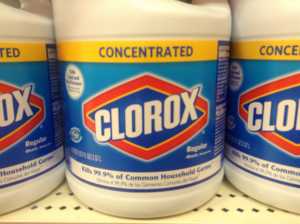20 Nov Should Bleach Baths Be Used To Treat Eczema?
MedicalResearch.com Interview with:
Dr. Jonathan L. Silverberg MD PhD MPH
Assistant Professor in Dermatology
Medical Social Sciences and Preventive Medicine
Northwestern University, Chicago, Illinois
MedicalResearch.com: What is the background for this study? What are the main findings?
Response: Bleach baths have become widely used in clinical practice for the treatment of atopic dermatitis (AD). However, there have been conflicting results about the efficacy of bleach baths across different studies. We performed a systematic review and meta-analysis to determine whether bleach baths are consistently effective in decreasing the severity of atopic dermatitis.
Bleach baths were shown to be effective at reducing AD severity in all 4 of the included studies. However, when comparing bleach baths vs. regular water baths, only 2 found significantly greater decreases in atopic dermatitis severity with bleach baths, 1 found greater decreases with water baths, and 1 found no significant differences. There were 15 different severity assessment evaluations across studies at 4 weeks: only 3 assessments demonstrated that bleach baths were more effective than water baths, 11 reported no difference, and 1 reported regular water baths to be more effective. In pooled meta-analyses, there were no significant differences observed between bleach vs water baths at 4 weeks vs baseline for the Eczema Area and Severity Index or body surface area. Finally, there were no differences of Staphylococcus aureus density, other bacteriological assessments or skin infection rates between bleach vs. water baths.
 MedicalResearch.com: What should clinicians and patients take away from your report?
MedicalResearch.com: What should clinicians and patients take away from your report?
Response: There has been controversy over the decades whether or not AD patients should bath regularly or not. This meta-analysis shows that regular water baths are not harmful in atopic dermatitis. In fact, regular water baths are in of themselves effective treatments for AD and should be routinely recommended along with guidance on proper bathing techniques and gentle skin care.
Readers should keep in mind that bleach baths are compound interventions that include soaking in the bath, application of moisturizer or topical medications afterwards and finally the addition of bleach per se. Although bleach baths are effective in decreasing atopic dermatitis severity, the addition of bleach does not appear to have much of an effect.
MedicalResearch.com: What recommendations do you have for future research as a result of this study?
Response: This systematic review challenges the current dogma on using bleach baths in atopic dermatitis. If bleach has beneficial effects in AD, then why were they not observed in randomized controlled trials?! This raises important questions about whether the standard recommendations for bleach baths are achieving the appropriate frequency, duration, concentration, pH, etc. It is vital that these issues be addressed more scientifically and systematically to determine the true benefits of bleach baths. Future studies of the efficacy of bleach baths should standardize a number of variables related to bath time and skin care practices as outlined in the manuscript.
MedicalResearch.com: Thank you for your contribution to the MedicalResearch.com community.
Citation:
Rishi Chopra, Paras P. Vakharia, Ryan Sacotte, Jonathan I. Silverberg. Efficacy of bleach baths in reducing severity of atopic dermatitis: A systematic review and meta-analysis. Annals of Allergy, Asthma & Immunology, 2017; 119 (5): 435 DOI: 10.1016/j.anai.2017.08.289
Note: Content is Not intended as medical advice. Please consult your health care provider regarding your specific medical condition and questions.
[wysija_form id=”1″]
Last Updated on November 20, 2017 by Marie Benz MD FAAD

